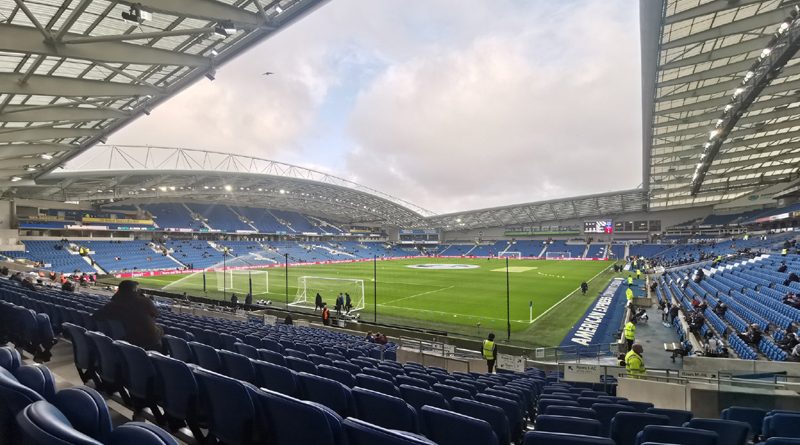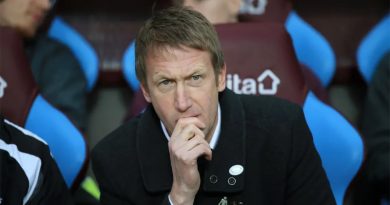What Project Big Picture would mean for Brighton & Hove Albion
Hot on the heels of the decision taken by the Premier League, Sky Sports and BT Sports to charge £15 per game for supporters to watch their club on television comes an even more controversial plan which would lead to the biggest shakeup in English football since 1992 – Project Big Picture.
The brainchild of Manchester United and Liverpool’s American owners, the plan essentially aims to hand full control of English football to nine clubs in exchange for more money being given to the EFL.
At a time when a huge number of the 72 teams outside of the Premier League are facing extinction due to the pandemic, it should be viewed as nothing more than an opportunistic power grab which would alter the competitiveness and the face of the game in this country forever.
For Project Big Picture to be voted through, it would need the backing of 14 top flight clubs. United, Liverpool, Manchester City, Arsenal, Tottenham Hotspur and Chelsea are all said to be in favour, hardly a surprise as the big six have the most to gain from the plans.
The three other teams who would hold voting power would be Everton, West Ham United and Southampton as the clubs who are on the current longest runs in the Premier League.
Should all nine approve Project Big Picture, then only five more Premier League sides need to give the green light to the plans for them to pass. Brighton would find themselves in a position whereby their vote could dramatically change the face of English football for the worse.
The Albion’s main consideration before deciding which way to go will no doubt be what can they get out of it. With that in mind, here is a rough guide to what Project Big Picture would mean for Brighton & Hove Albion.
The Premier League would be cut to 18 teams
First and foremost, Project Big Picture wants to cut the number of Premier League teams to 18 – which is bad news if you are a team like Brighton who consistently finish in the bottom six.
Whilst Tony Bloom has his publicly stated aim of turning the Albion into a top 10 side, at this moment in time a reduction in the number of clubs in the top flight would lead to the Seagulls’ chances of relegation increasing.
Brighton have worked hard to achieve their top flight status and a quick glance at the accounts suggests that slipping back into the Championship would be a disaster for both the Albion’s and Bloom’s finances. The club made a loss of £21.2 million in the last accounts filed for the 2018-29 season.
Voting to cut the number of teams so that the big six play less matches, can concentrate more on European competitions and have an increased summer break in which to organise money spinning friendlies across the globe would simply deny two teams such as Brighton the chance to get a slice of the Premier League pie.
Promotion from the Championship would become harder
If Brighton were to end up back in the Championship once Project Big Picture had passed, returning to the Premier League would be harder than ever.
The top two in the second tier would still be granted automatic promotion but the play off system would be changed so that the club who finished 16th in the Premier League enter the end of season lottery in place of the side sixth in the Championship.
With the gap between the top flight and the second tier growing all the time, the Premier League outfit should normally possess enough quality to ensure that they survive by winning the play offs, in effect reducing the number of promotion places to just two.
Brighton have a terrible enough record in the play offs as it is without facing the prospect of needing to beat a top flight club to secure promotion.
Brighton would lose their voting rights
The current Premier League setup is a lot of things, but nobody could accuse it of being undemocratic. Every club in the top flight has one vote worth equal value and changes to the game have to be approved by a majority of 14 – the number which would be needed for Project Big Picture to pass.
This helps to keep the big six in check. When the idea of keeping the five substitutes rule that we had seen in the final nine games of the 2019-20 season was put forward, it was very clearl that such a move would benefit the bigger clubs with deeper squads who could turn games by introducing more quality from their benches.
Unsurprisingly, the likes of Liverpool and City were hugely in favour. The proposal was voted down, largely because the smaller clubs could see how it could adversely impact their chances of success.
If Project Big Picture were to pass, then only nine clubs would have voting rights. The big six plus the three clubs who had been in the Premier League for the longest concurrent period of time. A majority of just six would be needed to pass new rules.
City, United, Liverpool, Arsenal, Spurs and Chelsea suddenly hold all the power to change English football in whatever way they see fit to suit their needs. By voting for Project Big Picture, Brighton would be surrendering their vote and their ability to shape the game.
Increased commercial opportunities
One aspect of Project Big Picture which might appeal to Brighton CEO Paul Barber is the increased commercial opportunities it would bring.
As already noted, the reduction in size of the Premier League and a later start date is designed to allow clubs to play money spinning friendlies across the globe.
The Albion are known to want to take the brand into the eastern states of the United States. Summer 2020 was supposed to bring with it a visit to New York and other cities on that side of America as the club sought to make the most of their sponsorship deals with American Express and Nike. Having extra time to carry out such foreign tours would no doubt please Barber.
There are also plans within Project Big Picture to allow clubs to individually sell the rights to up to eight of their matches to their own fans.
Clearly, this is designed to benefit the big six. Liverpool and Manchester United selling their fixture to a global television market will raise far more money than Brighton and Burnley trying to do similar.
If the Albion can establish themselves as a Premier League team for the eastern seaboard of the US to support however, Barber might fancy his chances of increasing revenue through broadcast rights across the globe.
It is an interesting proposition, although one which should be explored carefully given the backlash that Brighton received to the £15 Premier League PPV scheme.
Brighton’s chances of a foreign takeover would decrease
One of the more controversial aspects of Project Big Picture is that the nine voting clubs would have the power to veto any takeovers of other Premier League sides.
This means that should a Saudi prince, a Russian oligarch or an American media magnate come along and want to turn an English team into the new richest club in the world, the big six could block the takeover. It gives them the power to prevent any money which could threaten their dominance coming into the English game.
Nobody actually knows how rich Bloom is as he hides his wealth incredibly well. But say one day an even richer benefactor came along with the funds to turn the Albion into a side who could challenge for the Premier League title.
If Project Big Picture passes, then that takeover could be blocked by the jealousy and fear of United’s rich American owners, Liverpool’s rich American owners, City’s rich Abu Dhabi owners and Chelsea’s rich Russian owner.
Never again will a side be transformed from mid table fodder into the championship contenders overnight as happened when all those petrodollars arrived at the Etihad Stadium. The big six would become even more ringfenced.
Brighton could apply for a rebate on the cost of the Amex Stadium
Spurs, Liverpool and Manchester City have all carried out costly stadium works in the past 10 years with the Tottenham Hotspur Stadium famously coming in at over £1 billion.
It should not come as a surprise then to see that one rule change introduced under Project Big Picture would see clubs ‘rewarded’ for infrastructure improvements by being able to claim 25 percent of their costs back. Spurs could therefore see themselves getting a £250 million cash injection for having built their new ground.
The rebate would be time limited to projects carried out in the last 10 years. Which means that should Project Big Picture be passed before 2021, Brighton would be eligible to apply for 25 percent of the £93 million that the Amex Stadium cost to build.
Bloom and Barber might suddenly see just shy of £25 million dropping into the club’s accounts as a reason to vote through the proposals. But in reality, that is a tiny amount in exchange for surrendering all power to the self-interest of the six biggest clubs in the country.
£20 away tickets and safe standing
Project Big Picture includes some interesting proposals from a supporters perspective, presuming we are ever allowed back into stadiums again.
Away tickets would be capped at £20 down from the current levels of £30, clubs would have to give at least 3,000 tickets to away clubs and safe standing sections would be allowed subject to government approval.
These are all popular issues which Project Big Picture is clearly tackling to get fans behind the proposals. Is being able to stand at the Amex and saving £10 per away game enough of a sweetener to allow the foreign owners of the big six to control English football? Not for us, Clive.
The EFL receives a £250 million payment and 25% of the Premier League’s annual income
In exchange for the power grab, Project Big Picture is willing to compensate the Football League in a way which is unheard of. Which is why the proposals have to be taken seriously as the 72 EFL clubs have every reason to want them to pass.
£250 million would be made immediately available to keep clubs afloat. This cash is desperately needed with Leyton Orient chairman Nigel Travis warning that some teams are within five to six weeks of going bankrupt.
In the future, the EFL would be entitled to 25 percent of all the Premier League’s annual income. That would be a huge chunk of money which could secure the futures of many cash strapped clubs for years to come.
With the government refusing to bail out EFL clubs, the big six suddenly look like the only ones who care about the fate of the football pyramid.
The rest of the Premier League has given very few tosses about the EFL – including Barber, who has insisted in several interviews that whilst he wants to help teams further down the food chain, his priority is securing the future of the Albion.
The same Albion who received hundreds of millions in television revenue every year and pay their players in excess of £50,000 per week whilst clubs like Orient and Macclesfield Town face the possibility of extinction.
If you are an EFL club who are desperate to survive, you suddenly see the big six as your potential saviour. You do not care what is good for the game or want to listen to a club like Brighton who, up until now, have seemed to show a complete disregard for your future prospects.
That is what makes Project Big Picture so dangerous. In normal times, the whole of the football pyramid would be aghast at giving control of the game to a self-interested cabal of foreign owners who only have what is best for their clubs at heart.
These are not normal times though and the prospect of the big six rescuing clubs financially might be enough to swing popular opinion behind the proposals. Out of chaos comes opportunity, as the saying goes.
From what we know of Project Big Picture so far, Brighton have far more to lose than they do to gain. Throughout the pandemic, Barber has proven himself to be a sensible voice for the Premier League’s smaller clubs, leading the way on matches at neutral venues and the safe return of fans to stadiums.
Let us hope that he is now against these plans and can drum up enough support among the 14 outside of the big six to prevent them being voted for. Otherwise, Project Big Picture could herald the death of English football as we know it.




